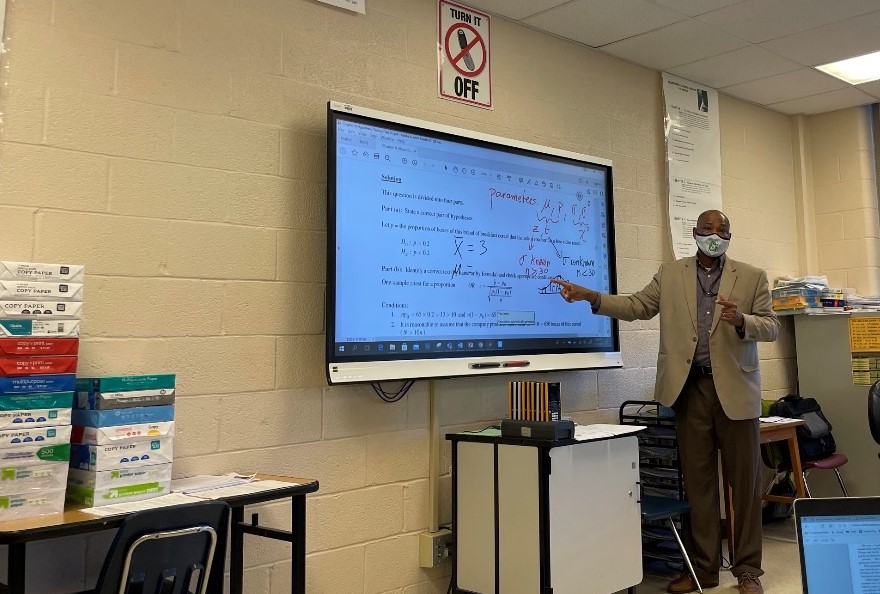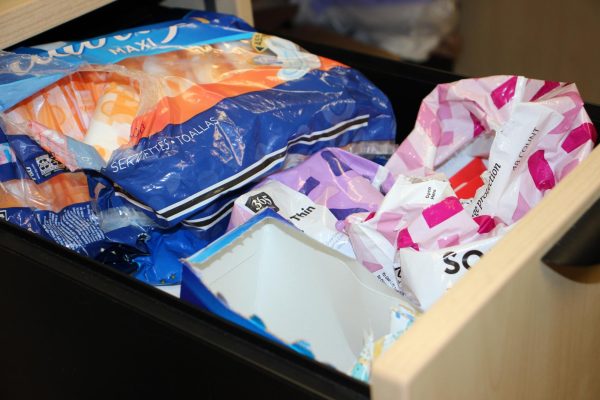One man with four jobs: Aboubacar Amadouide
Ide thoroughly explains a statistics problem by working it out for his students. Ide’s teaching style is unique: he trusts his students to do work at home, so solutions can be discussed in class.
Depending on the person, success may be defined by how much money you make or how much you have accomplished or just how happy you are. To statistics teacher Aboubacar Amadouide, known by his students as Mr. Ide, success is defined by how much you have impacted others.
Originally from Niger, Memphis was not always Ide’s home. Growing up in the French speaking country, Ide mastered the language as well as three others. Making the decision to move away from family and all familiarity was not easy, but with education as his top priority, it was the right thing to do in his eyes.
“First, I came for [an] academic opportunity to further my education after my bachelor’s [degree] in statistics,” Ide said. “Initially, the goal was to get a PhD in public health.”
Higher education, however, is very expensive. Ide knew he would have to find a way to pay for the tuition; this is how he stumbled upon the career path of teaching.
“The private school that was offering the tuition was out of reach for me: $6,000,” Ide said. “So I needed to find a job to have pay, so I got [a] teaching job as [my] first job ever. I was fortunate with the teaching job to have the state of Louisiana paying for my advanced degrees in college.”
After teaching French and math for 13 years in Monroe, LA, Ide gained connections to Memphis Shelby County Schools (MSCS) through a friend. After careful consideration, Ide moved to Memphis despite not knowing anyone or anything about the city, once again looking for better opportunities.
“I went to college with someone who had a job in [MSCS] as a math teacher, so through our contact and comparing our benefits, he convinced me to move to Memphis Shelby County because of better benefits,” Ide said. “That’s the only reason. I had no family members, no connections with Memphis. Just benefits.”
Ide learned to follow possibilities, but because of the financial restrictions, he could not further his education. To fulfill the part of him that wanted a different career, Ide now manages teaching honors and Advanced Placement (AP) statistics while also being employed by the Center for Disease Control and Prevention (CDC).
“For [the] CDC, [I perform] data analysis and translation of documents from French to English and vice versa,” Ide said.
Ide has capitalized on his desire to make a difference by heavily involving himself with two non-profit organizations that benefit different groups but have many similarities, such as helping those in need and providing necessities.
“I have two non-profits,” Ide said. “One is from African Health, Education and Development (AHEAD), [which consists of] shopping [for] very low-price clothing and school supplies for needy populations, especially school age. [The second is a] financial assistance program for needy people in Shelby County. One focuses on Shelby County, and the other focuses on Africa. It’s two separate [programs], but they [are financially] overlapping in sponsors.”
While balancing endless responsibilities and caring for his family, everyday has an intense schedule. On weekdays, Ide wakes up every morning at 4 a.m. to start his day, which includes working, teaching, praying, running errands for the non-profits and spending time with his family, ending his day around 10 to 11 p.m. every night. From this, Ide has learned to manage his time wisely through organization, elimination of unnecessary things and motivation derived from the impact of helping needy people.
“I have never played video games,” Ide said. “I barely watch movies. I don’t do unnecessary hanging out and talking. [I sleep] just the minimum necessary.”
Ide takes this lifestyle and hopes to instill similar practices in his students, hoping that when his pupils see him working hard, it will inspire them to work just as hard.
“Try to avoid being lazy,” Ide said. “Time lost can never be caught up. Procrastination is a waste of time. Never put off what you can do today. One of my professors told me, ‘All I can give you is one quarter of what you need to know.’ In other words, work hard to find the missing piece. The teacher cannot give you everything you need to know.”
Although Ide lives a busy life, his students note his good natured ways. Statistics is known to be a hard class, but Ide’s personality encourages students to take his class. His students can attest to his character.
“He’s definitely one of the smartest teachers at our school and friendly,” Harlo Jones (11) said. “I don’t think I’ve ever seen him get genuinely upset. He’s very wholesome.”
Among things like learning how to improve their work ethic, Ide’s statistics class teaches his students more than formulas. Ide draws his students’ attention to real life applications of statistics as well as how some lessons translate to the deeper meaning of life.
“[My favorite day in class was] the day he talked about Home Depot boxes vs. Lowes Boxes, and then he asked us to do statistics on the dimensions of the boxes,” Maanasa Yepuru (12) said. “He is very passionate about teaching. It’s all about life lessons that we learn. It’s about the deeper meaning of life.”
Although he is involved in many things, Ide remains humble and wants to leave a legacy as a simple man who loved helping people. He strives to improve lives whether in the classroom, for another continent or to research against disease.
“The purpose of one’s life is not for oneself,” Ide said. “My metric of success is not about how much I have accomplished for myself, it’s about how much impact I have on others. My motto is improving living and working conditions for people.”
Your donation will support the student journalists of White Station High School. Your contribution will allow us to purchase equipment and cover our annual website hosting costs.






































